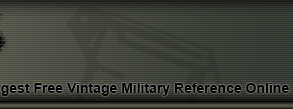NAVAL OFFICER DRESS SWORD - FUYU HIRO - MODEL 1883
This is a Japanese Navy officer's dress sword. Model 1883. It comes with a Samurai Katana blade that measures 26 3/4 inches.
All fittings are of the WWII time period. in overall very good condition. Complete with the scabbard. All of the components
are present.
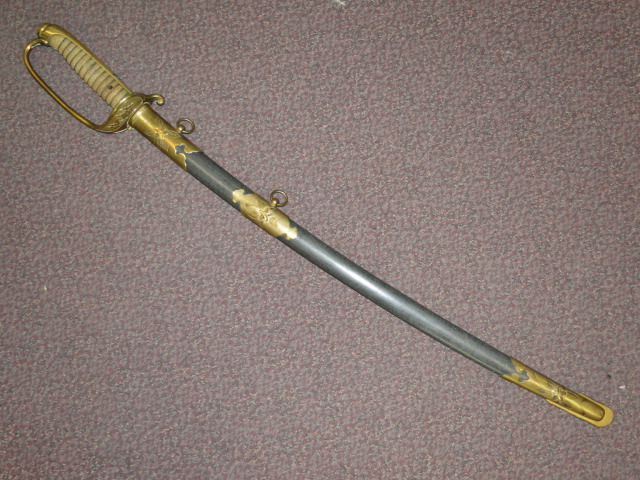
The handle is covered in ray skin. Very bumpy texture. A single hole is found. This is used to secure the handle to the
tang. A couple of large bumps are placed near the top of the inside of the handle. Brass wire
wrapping is applied.
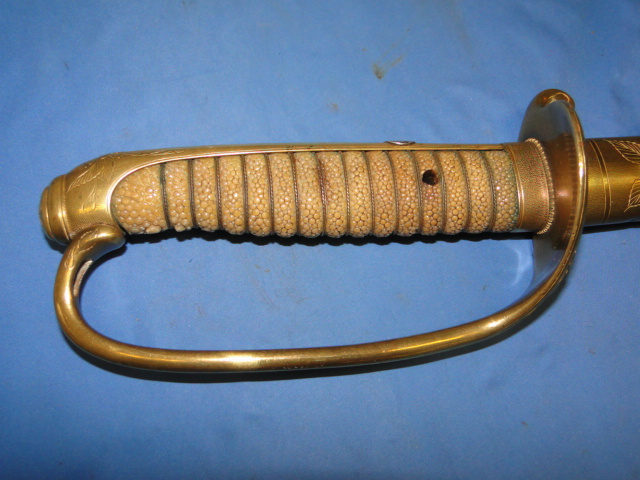
The crossguard has a very elegant design. It extends to one side and has two Chrysanthemum flowers in front of a lightly
pebbled surface. The flowers are surrounded by a series of leaves.
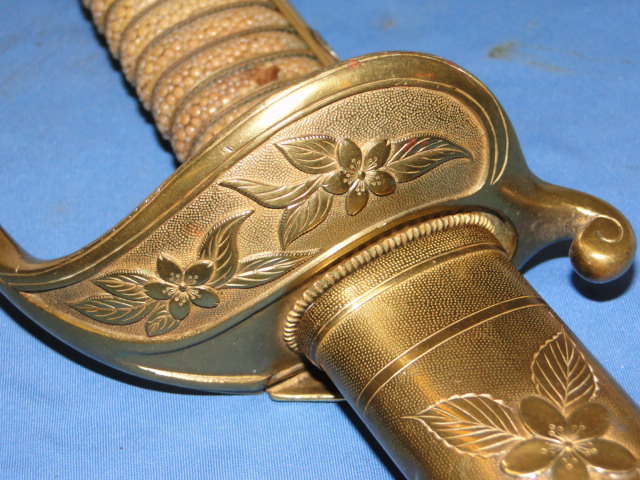
The spine of the handle has a family shield. The presence of the family mon usually indicates that the soldier has Samurai
lineage. However, some line of thinking is that it only indicates that the person had enough money to buy extra ornamentation.
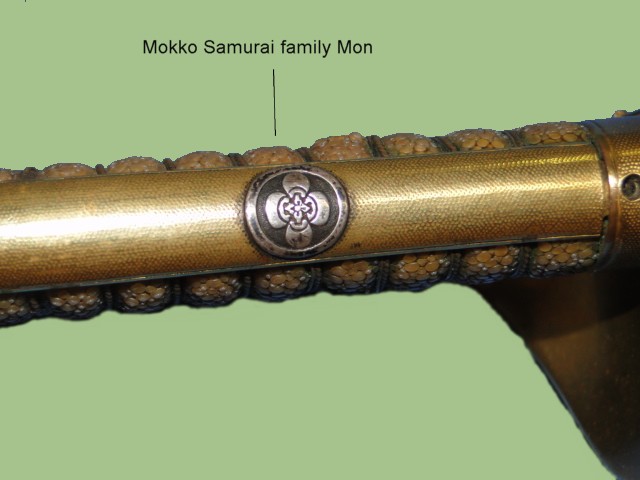
The side of the crossguard has a hinged section. When it is placed in the down position it locks onto a stud in the scabbard.
This locking mechanism secures the blade to the scabbard. The hinges section has to be moved up to be able to remove the sword.
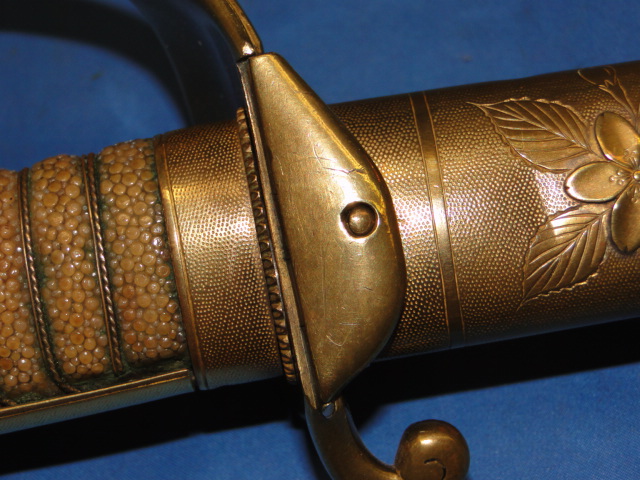
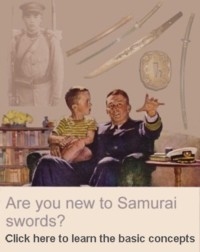
|
The Samurai sword has a very rich history. The sword has been manufactured for several centuries and continues
to be produced today. The sword represented more than just a weapon. It was the soul of the Samurai warrior.
When attempting to identify the type of sword you have It is important to keep in mind that the fittings of
a sword (scabbard, handle, crossguard. etc.) may be identical from one sword to another. The reason why is
because during WWII the same fittings were used in all Army swords, Navy swords, etc. Armed forces are all
about uniformity. They strive to make everything the same.
This is the reason why a sword cannot be identified merely by its external appearance.
Understanding the different components that make up the Samurai sword is the first step in figuring out the
type of sword you have. That is the reason why we have created the
Understanding the Samurai sword section as a means to
provide a novice with the basic knowledge to start the path of determining the questions everyone has;
who made the sword, how old it is nad how much it is worth.
|
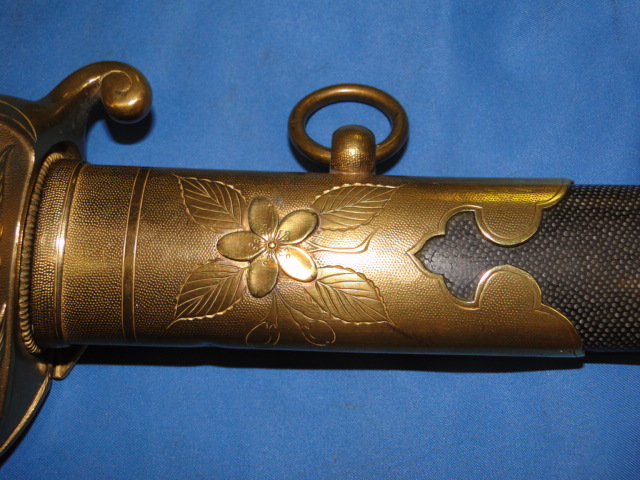
The scabbard has two suspension rings. the fittings are gold color and highly ornate. The main body is covered with shark skin.
The pommel has a Chrysanthemum flower on top.
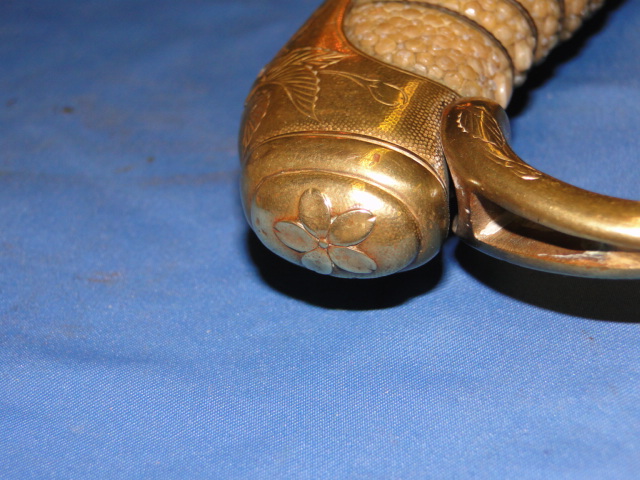
|
This page is a recognition and identification guide for Samurai swords.
Multiple detailed photos of a specific sample are provided. Descriptions point
out clearly defined points that should be noted.
One of the most commonly asked questions is "How much is my Samurai Sword worth?".
A price guide is included here to address this question. The value of the swords is
reviewed over a period of several years. A trend can be observed. The present worth
of the edge weapons in the collector's market is illustrated.
This service is provided free of charge to the visitor/enthusiast courtesy of
MilitaryItems.com,
a company dedicated to the preservation of military history and to providing quality
military antiques and collectibles to museums, institutions and the general public.
|
|
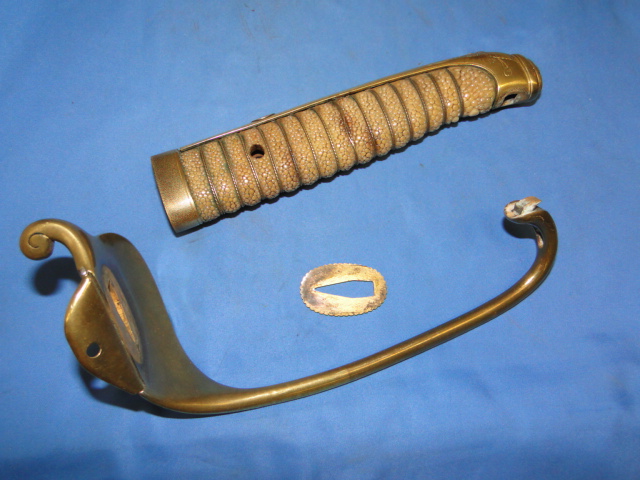
The handle of the sword comes apart in several components which are illustrated on the above photo. The handguard is the biggest
component because it also includes the crossguard. A single metal washer is also present.
The handle itself is covered with ray skin. Very bumpy surface with large knobs found near the top of the handle. The larger
the knob the more high ranking the officer was. The following photograph illustrates the location and appearance of the
bumps.
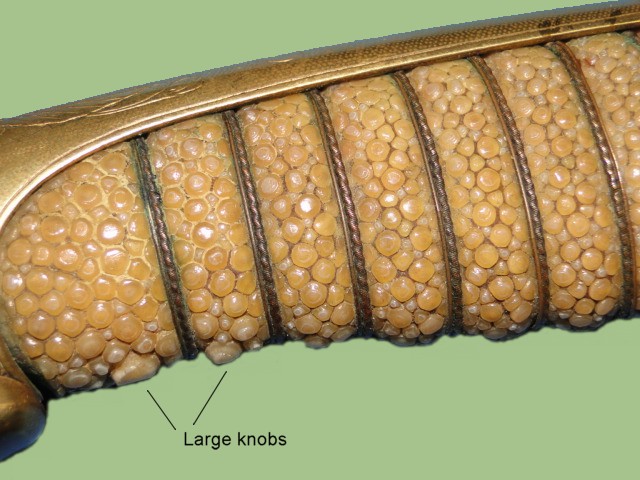
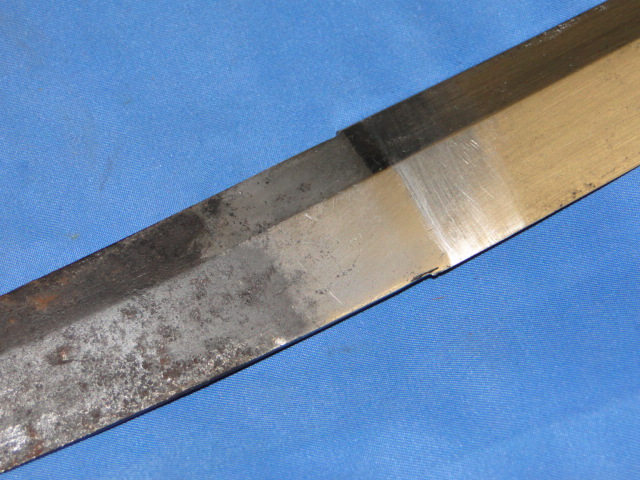

|
WE BUY JAPANESE SWORDS - All types of Japanese edge weapons. Whether it is a WWII era Samurai sword or an
older type of blade.
The process gets started by you sending us an
Email .
We will respond to your inquiry normally within 24 hours and in many cases much faster.
We can tell you what you have, what it is worth and how much we can pay you.
One sword or an entire collection -
Email Us .
|
 |
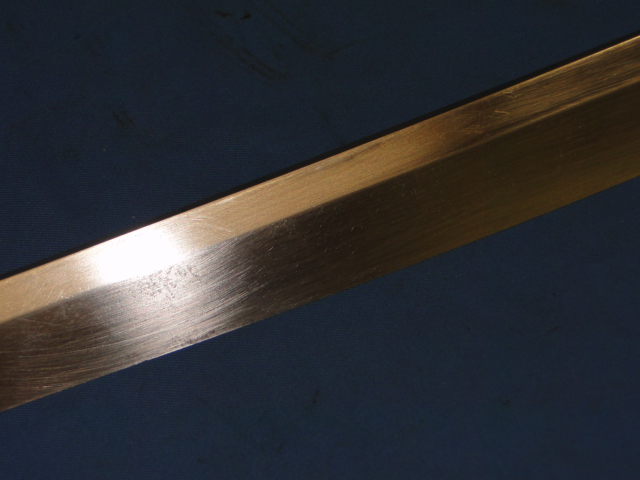
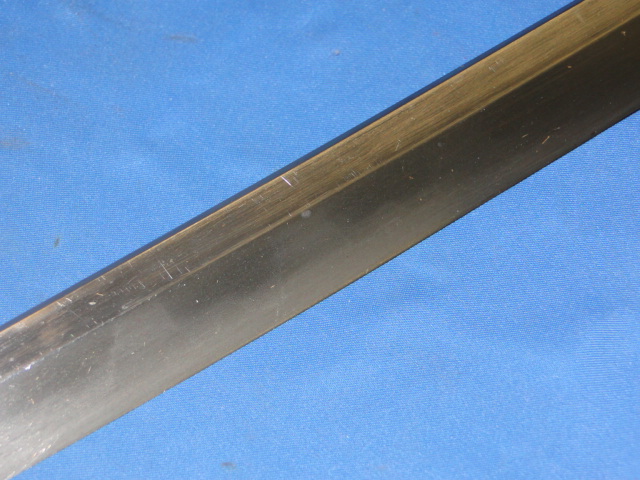
The blade retains the original polish. Most of the Hamon still visible. No nicks to the edge, the spine or the tip. Some
staining, perhaps from finger prints is present.
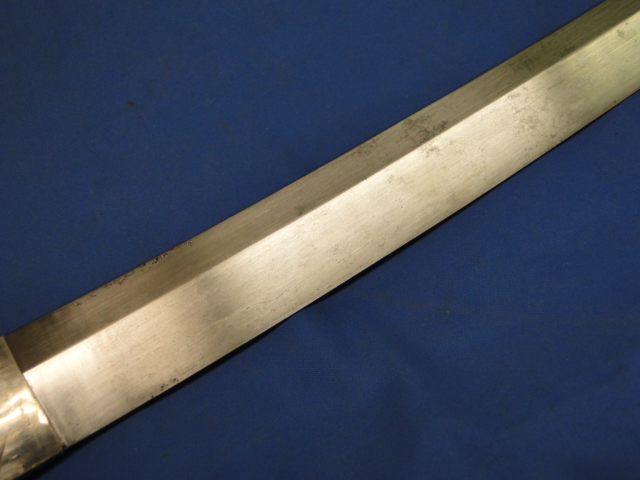
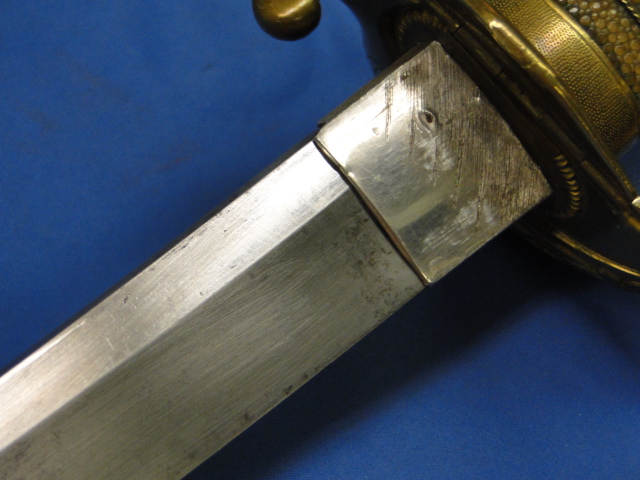
The Habaki is made of silver foil. The upper half is adorned with a rain pattern. This is a very nice
quality Habaki.
The follwoing photograph illustrate the tips of the blade and the scabbard. The Hamon is not easily seen on the tip of the blade.
The tip of the scabbsrd is beautifully constructed. Light pebbling is present around the body. A Chrysanthemum flower is placed near
the tip and has several leaves surrounding it. A drag section is added to proetct the main body from the ground.
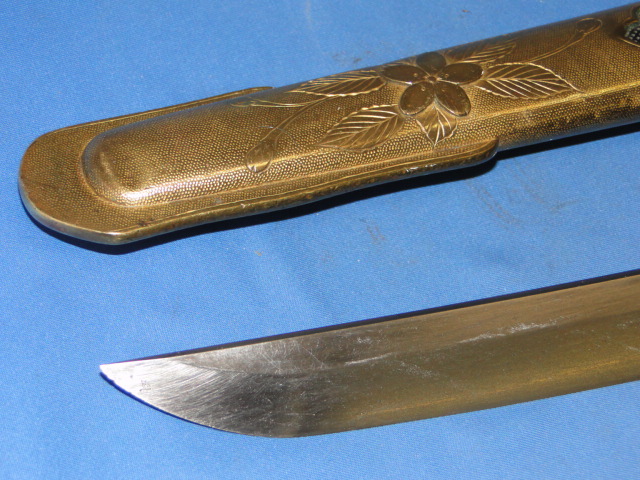
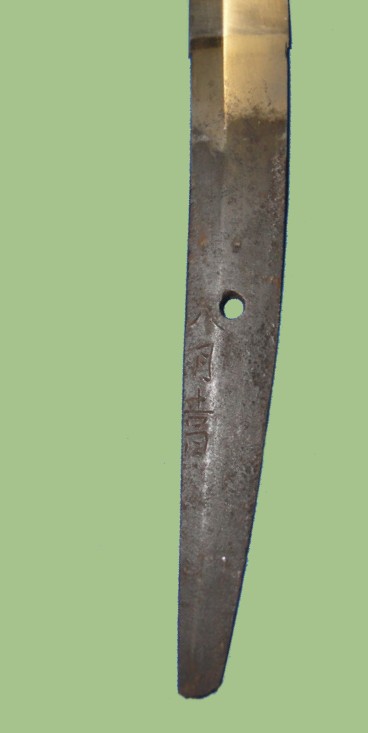
The tang has markings on both sides. One side displays the date while the other shows the swordsmith's signature. The blade is
old. It was created somewhere between the mid 1500's and the mid 1600's. Very nice patina is present. a deep dark rust color.
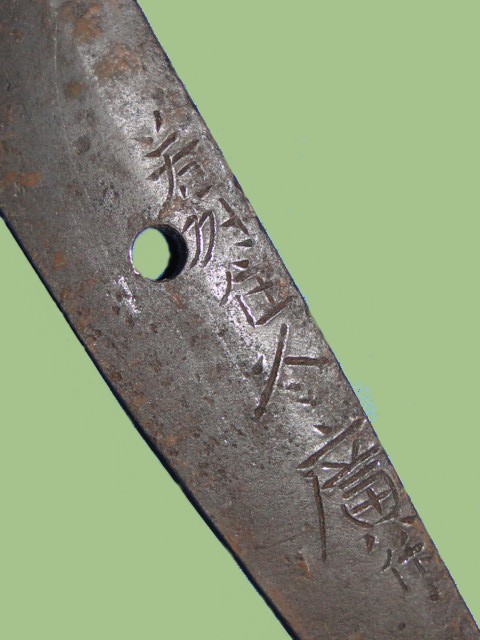
The date is composed of four characters. a breakdown of the trasnlation is visible on the photo below. The blade was made on
the month of August. Additional characters reads; "A luchy day" and "year".
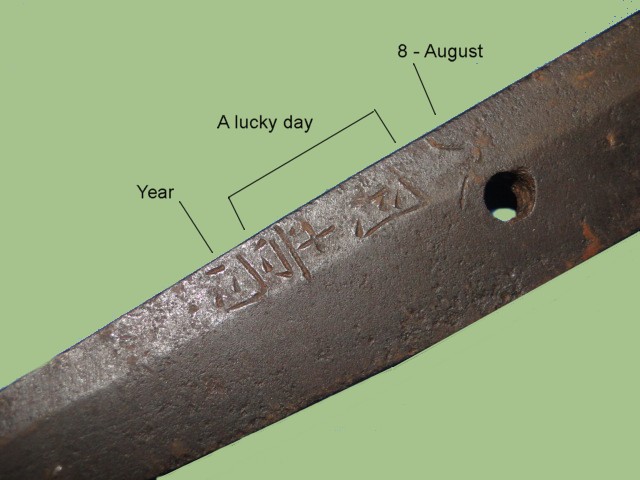
The other side of the tang has six characters that contained information such as the signature. The name Fuyu Hiro is
chiseled in.
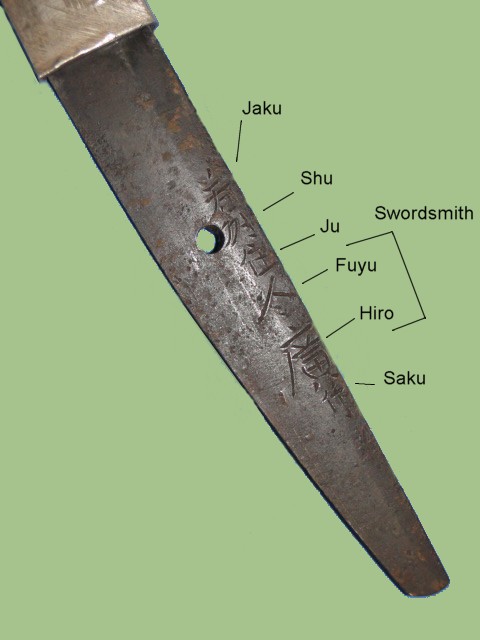
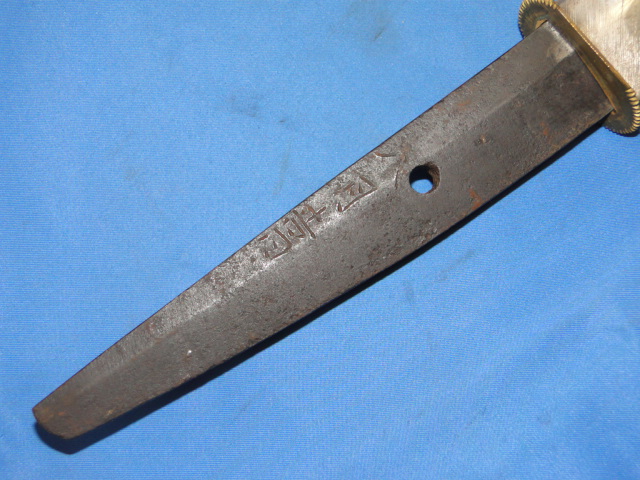
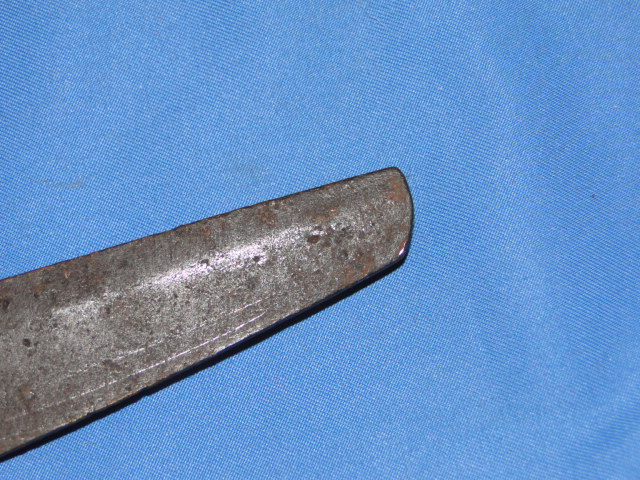
By the Numbers
It is next to impossible to determine the exact number of Samurai swords that were produced and issued to
Japanese soldiers during the war. However, thanks to the record keeping maintained by the US Armed Forces,
it is possible to estimate how many swords were actually shipped home.
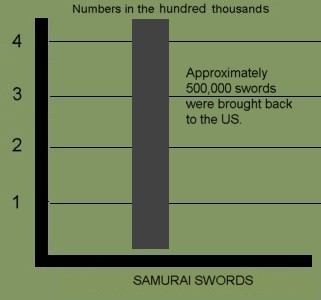 |
There were over 500,000 Samurai swords were brought back home as souvenirs from the war.
There are several caviats to this number.
|
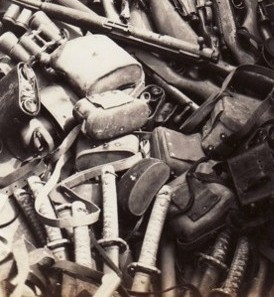 |
For example, some soldiers took souvenirs and shipped them home circumbenting the established process.
Some of the swords were brought back inside duffle bags without anyone knowing except for the soldier who
captured the sword. This fact would clearly affect the final count.
The number also does not account for swords that were taken by Allied soldiers from other countries.
Collecting Samurai swords
Collecting Samurai swords is a field that has been growing since the days the GI's rummaged around Asia
bringing back military souvenirs. Japanese soldiers carried many of these swords when they went to
battle. Once the soldier was killed or captured, the Americans would take the edge weapons as war trophies.
Eventually all these pieces came back to the United States where military history enthusiasts began to collect them.
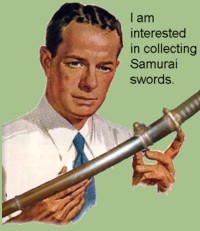 |
In trying to determine if you should collect Samurai swords there are certain factors that should be
considered.
The adjacent table outlines some of the advantages and disadvantages of collecting the Samurai swords.
|
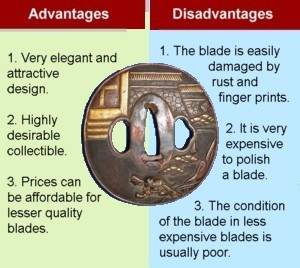 |
This Samurai Sword may be currently reproduced.
It is becoming more difficult to be able to tell the fake ones from the real ones because
the quality of the reproductions is improving. The collector must become familiarized with
the construction style and materials employed in the manufacturing of this item.
Attention to the details is critical in order to be able to determine the authenticity of
the collectible.
If you have an interest is seeing other Japanese Samurai swords, you can do so by going to our
Japanese Samurai Swords Price Guide
identification guide. Where we cover Samurai swords from all periods.
| 

